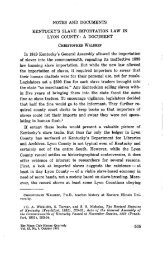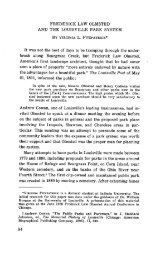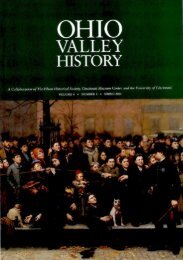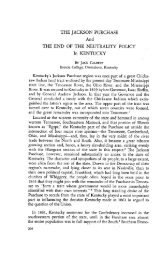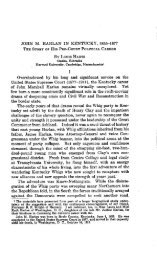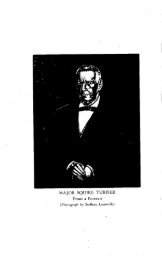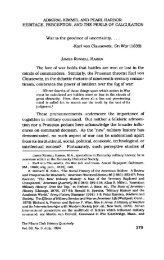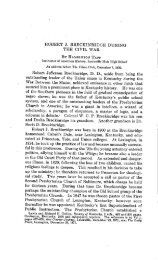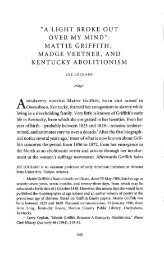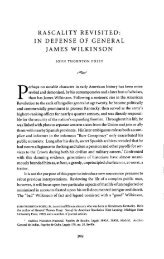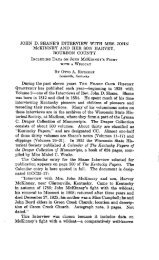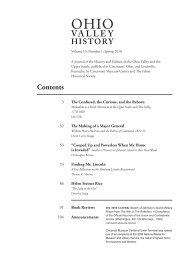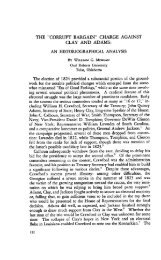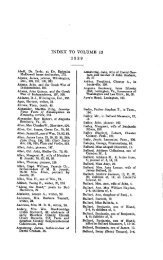JOHN TAYLOR AS A BIOGRAPHER OF PIONEER BAPTIST ...
JOHN TAYLOR AS A BIOGRAPHER OF PIONEER BAPTIST ...
JOHN TAYLOR AS A BIOGRAPHER OF PIONEER BAPTIST ...
Create successful ePaper yourself
Turn your PDF publications into a flip-book with our unique Google optimized e-Paper software.
<strong>JOHN</strong> <strong>TAYLOR</strong> <strong>AS</strong> A <strong>BIOGRAPHER</strong><strong>OF</strong> <strong>PIONEER</strong> <strong>BAPTIST</strong> PREACHERSBY DOROTHY BROWN THOMPSON*Kansas City, MissouriPart IWILLIAM M.ARSHALL• JOSEPH REDDINGand GEORGE EVE"The Baptists were the pioneers of Kentucky." This flat statement,without qualification, appears in William Cathcart's Baptist Encyclopedia,and as such may be conceded to be prejudiced. It has the weaknessesof most sweeping statements. But it has much truth. Because ofthat truth, a group of biographical sketches of frontier Baptist preacherscan be important. These were among the most influential men oftheir time and place- men who were deferred to, whose advice wasasked, who were the court of last resort to settle disputes. Many leftno record except in the memories, and sometimes in the changed lives,of their neighbors. Among the few who did leave a written recordwas John Taylor, who had come to Kentucky from Virginia in 1783as a young farmer-preacher; and in his sixty-seventh year began toset down certain matters he felt should be remembered. 1 At that timethe anti-missions controversy was shaking the Baptist Church to itsfoundations, and John Taylor felt impelled to publish a pamphletof his opinions, called Thoughts On Missions. Because it seemedhardly long enough, he added a few biographies of his associates.Except for church historians specializing in that period, the controversyis today a dead issue. But the filler, the padding, is valuable.There was no Who's Who on the American frontier, and Kentuckyhistorians and genealogists find themselves embarrassed by the absenceof direct documentation. It is only by piecing together the few memoirsand reminiscenses which remain, that we can assemble a connectednarrative, or recapture the flavor of the period. These particularbiographies have never been republished, and are not easy to find.Two copies are known to exist. It is through the kindness of the* EDITORtS NOTE: This article is, to a large extent, a republication of John Taylor'sbiographies of some of the Kentucky pioneer Baptist preachers, with much material anddetail added--the result of extensive research. In a letter to the Editor the author, DorothyBrown (Mrs. Dale M.) Thompson says: "Aside from the interest of John Taylor's ownhighly individual comment, there is a great deal of material in the notes which has not beenin print."258
1963] 1ohn Taylor, Biographer 259L•rary of the Southern Baptist Theological Seminary in Louisville,Kentucky, that one of these rare pamphlets has been made availablefor study.:Thoughts On Missions was published in 1819, three years beforeThe History Of Ten Churches which is John Taylor's notable work,which Sprague calls "the best picture of pioneer Baptists." This appearedin 1822, the second edition the next year. The only otherpamphlet he is known to have published was printed in 1830, TheHistory Of Clear Creek Church and Campbellism Exposed, which dealswith another period of controversy,s This last contains no biographiesas such, but the Ten Churches has a few sketches, added like theothers, as filler.4 John Taylor would have been entirely in sympathywith the debunking movement in biography. His comments are alarminglyfrank at times, and make the reader wonder whether most friendshipscould stand the strain. But they enable us to see the whole man--at least as John Taylor saw him.The weakness in Taylor's approach is his indifference to statisticalinformation. His audience was thoroughly familiar with such smallfacts as a man's parents and his wife's maiden name. In communitieswhere nearly everyone was kin to everyone else, family informationwas superfluous. There was no sense wasting as scarce a commodityas paper on such irrelevancies; the point lay in spiritual values. Butwe must take John Taylor on his own terms, and we can learn muchfrom him. If there is sometimes more salt than sweetness, at least theflavor is a vivid experience; the man stands before you, nobility,crochets, and all.Taylor discusses eight men: William Marshall, Joseph Redding,George Eve, William Kellar, and two pairs of brothers, Jesse andPhilen•on Vawter, and William and Richard Cave. All were Baptistpreachers.The sketches themselves are brief, so will be given entire (with hisown paragraphing and punctuation) and some framework of factsfrom other sources.WILLIAM MARSHALLBecause William Marshall was the first spiritual force in JohnTaylor's own life, it is not strange that he is chosen as the firstsubject for discussion. It was when John Taylor was about seventeen,that his father had moved to Frederick County, back of the BlueRidge on the Shenandoah River, where "Mr. William Marshall camepreaching the Gospel of the Kingdom." 5 The Taylors had come fromFaucluier County, where "in the year of our Lord 1752, I was born."John had gone to the meeting in the same spirit, he tells us, "that I
260 The Filson Club History Quarterly [Vol. 37would have gone to a frolic; for I had heard of the great effect thatwas among the people under preaching (for he was a son of thunderindeed). I went to the meeting with no more concern about my soulthan the horse I rode on." While he was watching the crowd, andpaying no attention to the speaker except as the occasion of a goodshow, John continues:About midway of hispreaching (for I had not noticed a word he said before)the word piercedmy soul as quick and with as much sensibility as anelectric shock. In a moment my mind was opened to see and feel the truthof all he said. I felt as if then at the bar of God, and as if condemnationwas pronounced against me. It may look strange; but I instantly loved thevery truth that condemned me, and instrument that brought it, Mr. Marshall.I had never felt such an attachment to any human being before, and thewhole of a quite new quality.It was not only impressionable boys who were affected by WilliamMarshall. He had great personal charm, and was a notable orator.His family° and background were quite different from the generalaverage of Baptist adherents at this time, when the level was admittedlylow. He was an uncle of the John Marshall who was later tobe Chief Justice, and brother of Col. Thomas Marshall. There hadbeen a nine-days-wonder at William's conversion; and many peoplewent to hear him out of amazement and curiosity at this young manof social prominence who had suddenly deserted his "fashionableamusements" to become a preacher of a distinctly unfashionable kind.John Taylor has told us how alarmed and distressed his own familywas, when he proposed to join this despised group.7At the time William Marshall began to preach, Baptists werebeing imprisoned, not on religious grounds, but as disturbers of thepeace. Hysterical manifestations, trance-like states, and what John Taylorcalled "strange exercises" were regarded, probably with reason, aspublic disturbances.° William Marshall was seized and about to beimprisoned, when his brother, Col. Thomas Marshall, succeeded inobtaining his release, after which he seems to have been let alone.Col. Marshall was the leading vestryman of Leeds parish from itsbeginning,° and always a staunch churchman. He was seldom out ofpublic office: Burgess, Sheriff, Clerk in Virginia; Surveyor of FayetteCounty, Kentucky; Collector of Revenue for the District of Ohio. Itmust have been embarrassing to find his brother- and himself- inthis position. Some years later, it became a matter of pride to have"preached behind bars." John Leland lists thirty or more preacherswho were "honored with the dungeon," i0 and the ordeal attainedthe dignity of martyrdom. At this time, it could scarcely have seemeda distinction to Thomas Marshall. Whatever displeasure he may have
262 The Filson Club History Quarterly [Vol. 37beginning with God's early decrees. There he found eternal justificationcouched in the doctrine of election, and so on with the several links of hischain, till he was led to find out, that the gospel address was only to certaincharacters, which when explained, were already righteous, though theywell deserved the name of sinner; but as for mere sinners, the law of Mosesonly was their portion. So much for deep thinking and a consistent gospel.But the fact was, Mr. Marshall seldom now preached even the law to meresinners; perhaps his work was done as an instrument in the conversion ofsinners, and his mind was led another way. He was much of a doctrinalfpreacher, and his addresses chiefly to the religious people. But Mr. Marshallound that a number of his Baptist Christians could not eat what theycalled his strong meat. This led him to doubt their christianity, or at leastthe soundness of their faith, which led on to a dispute in Fox Run church,Shelby county, where his membership was, which terminated in his expulsion,after which Mr. Marshall never would agree to return to thechurch, though a very little from him would have given the church satisfaction.A few years after, Mr. Marshall died, aged seventy-three years, andabout forty years after he began to preach in Virginia. He was an ownbrother of Col. Thomas Marshall, who lived and died in Kentucky; ofcourse a near relation to the well known family of Marshalls in this state.His reasoning powers were great, being a man of a strong mind. That tobe sure, is a family thing; for I never knew a Marshall of that family, maleor female, that was shallow pated. Mr. William Marshall, and especiallyin his Virginia days, was very tenacious of walking in all the literal commandsof God. The Saviour said, wash ye one anothers' feet. This hewould literally comply with among his flock. Paul said, salute with a holykiss; this he would do. James said, pray over the sick, anointing them withoil in the name of the Lord, &c. The literal unction he would perform. Hewas much of a man for prayer. Travelling with friends when they cameto the place of parting, he would prevail on them to alight from theirhorses, and kneel down and pray for each other, at .parting, as Paul did withhis brethren. He would pray over his drink, as over his food.When Mr. Marshall began to preach, he was tall and slim, very lighthair, a fair skin, and looked very pale. Soon after he came to Kentucky,he had a white swelling in one of his legs, which so drew the limb up,that he went limping on a crutch or staff for many years; after which, bythe throw of a horse, he got his opposite thigh broke. The bones so shotby each other in setting, that when he became well his legs were of equallength, so that he walked level without stick or crutch, with the loss ofabout four inches of his original height; after which he became prettycorpulent, and of a ruddy, wholesome aspect, so that his acquaintancecould scarcely have thought it was the same man. But with all this favourablechange, he must at last go the way of all the earth by death, wherewe hope he sleeps in Jesus till the glorious morning of the Resurrection,when his body will meet with a far greater change than all that has beenspoken of.John Taylor contributes to vital statistics the item that WilliamMarshall died "aged seventy-three years" which seems to have beenin 1808 or 1809. This would place his birth at 1734 or 1735.x4 Tayloralso mentions "John Picket,.5 whose sister Marshall had married" and
1963] John Taylor, Biographer 263"Reuben Picket, brother of John," both in the South River church inVirginia, where William Marshall had preached. William Cathcarttells us, in his Baptist Encyclopedia, that, "Upon his marriage withthe daughter of the Rev. John Pickett, [this should be William] apioneer Baptist minister of that region, he was brought under theinfluence of the gospel. In 1768 he was converted and baptized." Inview of the undoubted influence of his wife upon the direction ofhis whole after life, it seems a bit niggardly of these religious historiansnot to vouchsafe her even a given name. She was Mary Ann Pickett.The Rev. John Pickett was her brother, and their father was WilliamPickett, who was not a preacher, but a contractor and builder. He alsoserved as Treasurer of Fauquier County, and as custodian of thecounty's standard weights and measures. Mary Ann Pickett was marfledto William Marshall in 1766.16 Their eleven children were:1. George Marshall m Naomi Vardeman2. Lewis Marshall m Prudence Vardeman3. William Marshall m Rebecca Johnson4. Thomas Marshall m Acton Penn5. Martin Marshall m Matilda Taliaferro6. Elizabeth Marshall m Charles Ballou7. Mary Ann Marshall m Thomas Robinson [Robertson?]8. Susan Marshall m Charles Masterson9. Jane Marshall m Frank Durrett10. Hettie Marshall m Edward Ballou11. Lucy Marshall m Edward BookerMary Ann (Pickett) Marshall survived her husband, and was livingas late as 1831, when she gave consent for a daughter's marriage. 17William Marshall was associated with the first of the ten churchesdiscussed by John Taylor in his book, the South River Church, latercalled Happy Creek. This was on the southern branch of the Shenandoah,on the north border of Virginia, near the forks of the riverwhere it joins the Potomac at Harper's Ferry. The river valley isabout twenty miles wide and several hundred miles long, between thenorth mountain and the south mountain (Blue Ridge). It is famous,John Taylor tells us, for the fertility of its soil. It seems also to havebeen fertile soil for the new Baptist movement, the Separates orNew-lights. Under the leadership of Shubal Stearns from Connecticutand his brother-in-law, Daniel Marshall, they made a beginning in1754 at Opekon Creek, Virginia; moving from there to Sandy Creekin North Carolina the next year; and in 1760 spreading the enthusiasmlike a sudden flame through Virginia. This centered around
264 The Filson Club History Quarterly [Vol. 37Samuel Harris and James Read; Harris in particular traveled twohundred miles to baptize fifty-three converts at South River.rs Mostof the young preachers in that area, TM William Marshall,*° John andReuben Pickett, Elijah Craig, John Waller, James Ireland, JosephRedding -- were not ordained for several years. The Baptists permittedmen without special training to preach if they felt called andcould find listeners; but they were not allowed to administer theordinances of baptism or marriage without ordination, which camesometimes after a man had been preaching years, sometimes never.One result of the multiple preachers was the friction when the timecame to choose "a stated pastor." John Taylor says:Marshall and Ireland •t were the men about whom the contest arose. Eachman's children in the Gospel chose their own father as the Pastor of theChurch. Whether from Ireland's uncommon preaching talents, or someother source, he became the Pastor. Though these men were complaisantto each other, it is to be doubted whether the same tender affection existedafter this Pastoral straggle as before.The church had about two hundred members at this time. Soon after,Taylor reports, "perhaps through prudence, Mr. Ireland took leaveof the church as their Pastor and took the care of one or more churches,"and William Marshall became the Pastor.But he was not yet done with controversy. One of his own youngconverts, Joseph Redding (see biographical sketch later), began topreach about 1771, and after about a year moved his family to SouthCarolina. John Taylor says:**While there, he became a little dipt into Arminianism. He returned thenext spring, and soon became ordained an eider of the Church with othersalso; for in those days, some were ordained elders, who were not preachers.Marshall had gotten as much above the common style in divine decrees asReding was below it; and a heavy dispute arose between them about doctrines.Their grievances at length got into the church and produced greatexcitement there. This contest terminated as in the case of Paul and Barnabas;Reding took a letter of dismission and moved to Hampshire county,adjoining the Alleghany Mountains, where he had a great opening forpreaching. The struggle in the church did not subside with Reding's removal,nThe contest continued till some of theparties got excluded. Ina few years, Mr. Marshall moved into Culpeper County, and I think fromthence to Kentucky in 1779 or 80.According to Cathcart, on reaching Kentucky, he settled first in LincolnCounty. In what Taylor calls his "days of success" he constituted anumber of churches,u among them Hanging Fork of Dix River (latercalled Providence) which started in'1787 with twenty members. Anotherwas Crab Orchard in Garrard County, first called Cedar Creek;it began with forty members in 1791; the next year's great revival
1963] •ohn Taylor, Biographer 265brought the membership to four hundred.• Another was Fox Run,whose name was changed to Eminence after nearly a century; this onthe northern border of Shelby County. John Taylor says WilliamMarshall "raised up Fox Run Church and became its pastor," but theylater excluded him for *'hurtful changes in his doctrinal views." Heseems to have become so extreme a Calvinist that he took the positionthat predestination was so certain that there was no use tryingto convert anyone. He "remained out of church relation the rest ofhis life." 2,In the Ten Churches,• Taylor describes a visit, made with a boyhoodfriend of fifty years standing, to the old Meeting House atSouth River where they had first heard Marshall:Thomas Buck was one of the fifty-three first baptized at South River. Hewas then a lad about fourteen years old. Perhaps not one of the others arenow alive, for it is more than fifty years ago. I was at his house eight ornine years ago, and riding in sight of the old meeting house, I proposed toride in and take a look at the old skeleton. One object with me was to seethe great white oak stump, three or four feet over, and its mighty trunk thathad always laid there when I resorted to the meeting house. What made thisgreat stump so sacred to me, was that the preacher (Mr. Marshall) stood onit when, I hope, spiritual life was preached into my soul, though it seemedlike a blow of death to me... When we got to the old house, it was anentire old waste. The trunk of the oak was quite gone. The old stump onwhich the man had preached more than forty years before, but little of itwas there . . . With grateful hearts we thanked the Lord we stood theremore than forty years ago. Superstition would have said, Take some of thisold stump home with you, to look at till you die.John Taylor would have agreed with the estimate of a historian of ahundred years later, "He was the best, if not the greatest, of theMarshalls." 2sJOSEPH REDDINGJohn Taylor's biographical sketch of Joseph Redding (Rediug,Redin) was much longer than the one on William Marshall, and hadevidently been written three years earlier,• soon after Redding's death,and later incorporated in the Thoughts On Missions pamphlet. JohnTaylor had known Joseph Redding almost as long as William Marshall,but quite differently. William Marshall was John Taylor's fatherin the church, and shared with James Ireland, who baptized him, inJohn Taylor's veneration as elder and teacher, even where they haddoctrinal differences.Joseph Redding was almost Taylor's own age, and they traveledand preached together in Virginia, South Carolina, what is now West
266 The Pilson Club History Quarterly [Vol. 37Virginia, and Kentucky. They shared adventures and misadventures,some tragic, some hilarious, all over that rugged country,s° Althoughthey had their differences, in the main they seem to have been morethan usually congenial. Because this account is so detailed, perhapswe had better begin with John Taylor's own report:<strong>OF</strong> JOSEPH REDING--February, 1816Lest the name and character of the deceased should be forgotten (graftrudeforbids), a long and intimate acquaintance with the late Elder JosephReding [John Taylor spells it Reding throughout] the space of half acentury, leads to the following statement:Mr. Reding was born in the lower end of Faquier county Virginia, at aplace called Germantown in what date is uncertain, but most probably in1750. His mother was from Germany, his father of Welch extraction; sothat he was a mixture of Welch and Dutch. The parents of Mr. Reding,both died when he was young, and left an orphan family of seven or eightchildren, who were raised by an uncle of theirs, William Reding, in lowcircumstances, so that the Elder s opportunity was remarkably slender as toeducation. When grown, he could barely read, and but little above spellingas he went. He could write some. His views were the common sport ofthat day. In religion he was a fire-hot churchman, the established order ofthe day. He married at the age of about eighteen years to Anna Weakley,sla prudent, sensible, and very industrious woman. Though Reding marriedso young, he was fully grown, strong built, approaching to two hundred inweight, of a touch-me-not stamp. The weapon of his warfare, to defendeven his religion, was his fist. About this time, the Baptists, then calledNew Lights, began to preach with great success in the region where helived; but Mr. Reding kept close, and disdained to be deceived by the falseprophets, as he called them. As he lived on a public road, on a stormyevening a waggoner desired shelter in his house through the night fromthe weather, which was granted. This waggoner, Joseph Baker by name,was young in religious profession, and being heard to groan or sigh as hewent out to attend to his horses, Isaac Reding, an older brother than Joseph,and a better scholar, remarked to his brother when he heard the waggoner'sgroan as he went out--that man is a Baptist, and I'll confute him whenhe comes in and all things get settled. The agreement was, that JosephReding was to be silent and Isaac do the converting work with the waggoner.If any fist work was needful, it was to be done by Joseph, as hisbrother was a small man, and Baker the waggoner, pretty lusty. Early inthe night Isaac began his operations; but to Joseph's great astonishment, inthe debate, his brother was worsted by the waggoner, who couldn't read aword in any book. Joseph got very angry at Baker's success, and to preventusing him ill in his own house, went to bed. and left them disputing, thoughhe did not sleep till Isaac was brought to complete silence; for which Josephdetermined to whip his brother when the waggoner was gone. But Bakerso seasonably applied his victory'that poor Isaac slept none that night, norJoseph himself through chagrin and resentment. Baker drove off in themorning before Joseph was up. When he had risen to do with his brotheras he had designed, poor Isaac trembled as if Belshazar's fit was on him,
1963] ]ohn Taylor, Biographer 267and with floods of tears could have fallen under his insulting brother'sfeet, like dear Abel, for his desire was to Cain, when that wicked monstermurdered him; but in case of the Redings nothing more was inflicted thanharsh words. The next day at a log rolling in the neighborhood, Josephto make himself a little merry at his brother's new religion, informed hiscomrades (when they saw Isaac look as solemn as death) that a waggonerhad converted him last night; the soundness of which conversion theywere determined to try partly by sport and partly by ridicule. Several laidhold of him, and led him a black log, where some held, while one of themost hardy rubbing his hands on the log, and then on Isaac's face, madehim black as a negro, all which he bore without resistance, while tear*streamed from his eyes and he trembling, prayed to God to have mercy onhis opposers, while the one that did the blacking, in a tremor cried out,good God, Isaac, what alls you ? The whole company was alarmed andJoseph h mself did not escape a blow that never left him. How marvellousare God's works of grace, and from what small beginnings does he effecthis great designs! A sigh or groan of a poor illiterate waggoner producesthis dispute with the Redings, which terminates in their speedy conversion;and within six months' time, under these men's ministry, the neighborhoodwas alive with lively saints.Something uncommon attended Isaac Reding's conversion. One peculiaritywas profuse weeping, and while his vast sorrows trickled from hiseye-lids, his whole body trembled with such violence, as if his joints woulddislocate. He was truly a Shaker. If from the height of God's sanctuaryhe looks to them that tremble at his word, he soon looked to Isaac Reding.About one month from his first awakening he obtained a happy deliverance• and soon joined the people so much then despised, the Baptists. I havesaid something of this man's ministry. He immediately after being baptisedbegan to preach, and with some success; hu6 though his understanding inthe scripture was very good, his usefulness in council and his character everyway recommended him, his lack of talent to communicate was such, thechurch at length thought it most prudent for him to desist from publicspeaking, which he bore with all the patience of a lamb. His help in thechurch was sensibly felt. Myself lived long a member with him. He camethe nemrest a spirit of prophecy, or foretelling things to come, of any manI ever was acquainted with; to rite instances here I esteem not seasonable.He died about fifteen years past: in Woodford county, a member of ClearCreek church.I have already hinted at the frolic Joseph Reding had at blacking hisbrother's face. He took much alarm, and invited William Marshall topreach at his house, at which time in presence of all his old comrades, hetrembled like Felix, the Roman governor, while Paul reasoned, &c.; butnot like him in putting the thing off for a convenient season; but receivedthe word with all readiness of mind, like the noble Bereans, and with anoverwhelming consciousness of guilt, soon obtained relief in the blessedSavior and was baptised about September, 1771, when he was about twentyoneyears old, then I suppose the Father of two children. He was baptisedin Shenandoah river, then Frederick county. He immediately lifted up hisvoice like a trumpet, and sounded out hell and damnation at a most fearfulrate. Nor was his preaching free from the sweet charms of invitation. Thetruth was, the Lord soon blest his labors to many of his neighbors, of whichmy own soul is a witness; for I then lived in the neighborhood, not yet
268 The Filson Club History Quarterly [Vol. 37grown. His gifts at that time, to be sure, as a preacher were small; buthis soul was in the work. He had the spirit of preaching, and would bewarning or persuading sinners in his sleep. Perhaps no man exceeded himin zeal both to make appointments and attend them after made. He consideredan appointment to preach too sacred a thing to be neglected. I wiUgive an instance or two. With myself he had a meeting appointed, aboutfifteen miles from his house. I went to his house the over night for anearly start. He lived in the woods, had neither stable nor pasture; ofcourse we belled and turned our horses in the woods. The night provedrainy, and next morning very wet. We searched for our horses till abouteight or nine o clock, and failed to find them. We did not hesitate amoment to take it on foot, a rough, mountainous road, it then raining; anda most heavy day of rain it proved. We had to travel in a half run to getto the place, and met not more than twenty people. At another time wehad appointments for a week or ten days. I got to his house the over night,the first meeting was twenty miles distant. Perhaps the only beast heowned was a mare with a young colt; my horse was young; the weatherhot; we did not hesitate to go on foot; set off at sunrise, got to the twentymile meeting in time, and a blessed meeting we had; for the Lord seemedto much bless the people. The next day we traveled on foot over mountainousground thirty-eight miles before and after meeting, and both of uspreached to the people, after which our stages were shorter. The wholetour was about a hundred and fifty miles, about the head waters of thePotomac river. I give these instances of zeal as a sample of Mr. Reding'swhole life in the ministry, which from beginning to end, was upwards offorty years.In 1772, about nine months after he began to preach, he moved with hisfamily to South Carolina, a distance of five or six hundred miles. While inthat country he became intimate with a David Martin, a Tunker Minister,a man of great influence,, and much of apreacher. Through the art ofMartin, our friend Joseph s mind got warpedoff very much into Arminianism.However, he not being satisfied in the religious society in Carolina,in the spring of 1773 he moved back to Virginia, and became a memberof Shenandoah church, South river, now called Happy Creek church, wherehe was baptised, and where William Marshall then had the pastoral care.He was soon ordained, to the office of Ruling Elder, which in those dayswas often conferred on men who did not preach. There soon arose a difficultybetween the Pastor and Elder; for Marshall was more than a warmpredestinarian, though himself before had been much stained with Arminianism.This dispute arose so high, that Reding left the church, thoughlegally dismissed, and much beloved by far the greater part of the church;for but few of them accorded with the measures of the Pastor. Mr. Redingnow moved into Hampshire county,s* the then back settlements of Virginia,where he had a vast range of preaching, no other preacher living at thattime in the county. He was free from legal persecution; for no establishedPriest was there. And though the raging flames of the revolutionary warblew up many churches in the lower part of the state, our Joseph as an instrument,was building up a number of flourishing churches in its backsettlements. He laboured incessantly night and day, for five or six years.Perhaps he might never have called in question his mixed plan of preaching,only for the Methodists, swarming thick in the country where he
963] John Taylor, Biographer 269ranged. According to their mythology, they strain hard to make their fableshang together; and there may be at least apparent consistency in error. Thisled Mr. Reding to think of consistency. He being naturally strong minded,and Sovereign Grace having converted his soul, attention only to his Bible(almost the only book he read) could set him right in a little time withouthuman aid (except the Methodists.) He came out one of the most clearheaded Predestinarians the Baptists could boast of, with a new and expandedidea of many scriptures, locked up to him before, which gready augmentedhis usefulness to the ministry. His circumstances in life being low, andhaving a growing family, he, with a number of his church, in the fall 1779set off to move to Kentucky, to take water at Redstune." After embarkingin their boat, they met with a shipwreck. While in their strait, one of thecrew cried out to Mr. Reding--what shall we do? His reply was, throwme overboard; from which it seemed he thought he had erred in the enterprise.They had to stop all winter. His friends prevailed on him to go onwith them the next spring, and a most gloomy time it was for Indian warfare.They landed at the falls of Ohio in March or April 1780, where allwere shut up in forts. There was no opening forpreaching, from the greatdistress the people were in. One of his children died soon after he landed.He determined to return from whence he went, and though the wildernessitself was two hundred miles, and the greatest haunt of savage rage, hepassed his family through; and the whole journey was six hundred miles,and chiefly a wilderness. In June the same year, he re-entered the samehouse he left the fall before, in Hampshire county, Virginia. It is probablethe county was a hundred miles square, and no Baptist preacher living in itbut himself, though there were plenty of Methodists, against whose doctrineshe was now a great warrior. He traveled without intermission, andI suppose preached more times than there were days in each year. Therewere four or five churches in his range (mainly planted by himself), hehad the care of them all. Thus he continued till the spring 1784, when witha number of his members he moved again, high up in the state of SouthCarolina. There he was popular and his range great. He was now in theprime of life, and a thunderbolt against Arminianism in all its shapeswherever he found it. For he never treated what he esteemed error witha sparing hand. He was one of several other ministers, who alternatelysupplied the church in Charlestuwn, before Mr. Furmon took the pastoralcare of the same. Mr. Reding continued between four or five years inCarolina; for in October 1789 he arrived in Kentucky, just at the time ofthe sitting of •Elkhorn Association.84 On Sunday, he was with others appointedto preach; and as a new broom sweeps dean, Reding swept allbefore him. Ganos5 himself was not his equal. By the imprudent tonguesof some of the Baptists, whether the preachers of Kentucky did not becomea little envious, and the newcomer a little lifted, is yet to explain; but certainit is, but lirtle harmony subsisted between him and other preachers inthe country for a considerable time. In 1790 he moved to the GreatCrossings,a8 where Elijah Craig had the pastoral care;a• but being much en.gaged in speculations, preached but little. But as Reding was a dailylabourer in the Lord's harvest, a majority of the church soon turned theirattention to him as their Pastor. This stirred up great difficulties betweenthe Preachers. Craig was excluded, and that affair, as they were both menof talents, went near dividing the whole Elkhorn Association. The
27O The Filson Club History Quarterly [Vol.. 37Crossings church they did divide, from which the church at M'Connel'sRun was brought into existence, where Craig took his membership. Inabout 1793 Reding peaceably took the pastoral care of the Crossings church,which care he continued about sixteen years, through which term the churchwas much enlarged; hundreds were added by baptism, till she was so overgrown,that several were constituted from her, and she still continues oneof the largest and most respectable in Elkhorn association; and for aPastor is now under the care of James Suggett, son-in-law to Mr. Reding,and was baptised by him.ss In 1809 our Joseph took a letter of dismission,and joined a large and respectable church, planted by his own instrumentality,called Dry Run, it being more convenient to where he then lived;but it is thought this convenience was not all his object in leaving theCrossings church. The great difficulties in society about Creath,•° were nowin their highest rage. The former Licking association was in agitation, andthe church at Dry Run was more favorable to that subject than the churchhe left; and he was a great zealot for the new association, as well as all themovements against Creath. In the new establishment (Licking association)he was fervent, for his make was not to do things by halves. With him wasconnected chief of the effective part of Elkhom association. This explosionin Baptist societ% was dreadful iadeed; for its effects were felt afar off.Perhaps this age will not finally remove the odium. Though our hero wasnow advanced in life, perhaps sixty years old, his strength both of body andmind for ministerial labour, his will also leaning that way, he bore up likean ox to the yoke, itinerating among the churches of his new establishment,till on a tour of preaching in Woodford county, he was smitten with a• paralytic stroke from his hips downwards, which in a manner took awaythe use and feeling of that part of his frame. He still traveled and preached,when from his own account, he could scarcely feel the stirrups, or thesaddle he sat on. A second stroke of the same kind followed not longafter, and a third about a year before his death, that considerably affectedhis speech and his reasoning; under all of which there was great patienceand resignation to God.He departed this life in December 1815, aged about sixty five years. Ifwe are to judge from actions, which is the only rule by which finite creaturescan safely judge; in that case Joseph Reding was among the mostzealous and laborious ministers of which we ever had any knowledge. Therenever appeared any hesitation when it came to his lot to preach. His lungs(in his prime days at least) never seemed to fail. After preaching day andnight for months together, he could sing clear as if all was sound, andwhile preaching he never seemed to spare his lungs,4° considering histalents when he began to preach, or his opportunity of improvement throughlife, he was a prodigy among men. He seldom ever read any book but hisBible. Perhaps his library would never have sold for more than ten dollars,and yet as a preacher he was well skilled in the mysteries of the kingdom.The means by which he most improved was being in company with improvedmen; for his mind took in with ease what he heard from others•He generally seemed when preaching to wall understand the subject hehad in hand. The truth was, he knew how to preach and what to preach.He knew how to preach; for he only dwelt long enough on each point inhis subject to explain it, nor dragged in a redundance of evidence, tosubstantiate a point already proven. His sermons therefore were generally
1963] ]ohn Tailor, Biographer 271short, seldom overgoing an hour and generally dosed with great pathos.He knew what to preach; for his doctrine well agreed with the analogy offaith. With him human testimony, or 1 say, only had its own little weight.He only chose to bring forward authority from heaven; he was thereforevery confident in what he preached; he taught as one having authority, andnot as the scribes; and yet I have seen him so much embarrassed as todesist from preaching, after making some advances on his subject.In his stature, he was about five feet eight or nine inches high, veryheavy built. So far from being stoop shouldered, he rather leaned back,and had a majestic front; his hair was black, lying close and turned backfrom his forehead; his skin rather swarthy than fair; his mouth wide, andwhen in a pleasant humor, showed all its size; his teeth stood wide apart;his eyes rather dask, but blue; his look generally bore this aspect--i/ youapproach me as an enemy, it is at your peril. His constitutional make wasfaithful and benevolent to a friend; but take care, enemies. Whether itgrew from the nature of that severe mixture of Welch and Dutch blood, orfrom uncommon zeal and faithfulness to do God service, is hard to say.But surely his severity at times overleaped the bounds of christian charity,and hard censure came first, when candor wonld have plead an apology.He was so remarkably afraid of flattery, that he was seldom ever known topraise any man, or highly applaud anything he had done. By this rulemen may look for rewards only in the world to come. If censure or findingfault, would do a man any good, he might get amply supplied from hismagazine. It can therefore be accounted for, why but few young preacherswere ever raised where he had the care. We see by the foregoing biographicalremarks, Mr. Reding, an orphan child, directed by providencebefore he had grace; in his marriage better suited, all things considered,than any other man; we see him traveling in long journies with his family4000 miles before he settled in Kentucky, preaching with success whereverhe went. He had many children; a number of them died before him. Hisfamily was left in easy, though not affluent circumstances. His livingchildren are all married.41 Though Joseph is gone I have no doubt he isyet alive with his Savior.Joseph Redding's differences with William Marshall were discussedin the earlier sketch, and this only serves to sharpen the impression.The two men could hardly have been more different in background,but the over-sophisticated and the over-rough took fire from the samespark, and there can be no doubt of the sincerity of either. Each seemsalways to have been a storm-center, and when they came together anelectric charge was inevitable. John Taylor loved both, and lets ussee them more clearly than any other biographer has done.The condition of "little harmony" surrounding Redding's encounterwith Elijah Craig, is given very little space by Taylor, mentioning itas a chapter he would like to forget. He mentions that Elijah Craigwas much occupied with land speculation.42 This buying and sellingof land warrants amounted almost to a fever, and the Craigs were
272 The Filson Club History Quarterly [Vol. 37among the most successful, seeming to have a special gift. John Taylorsaid on one occasion that if anybody ever succeeded in serving bothGod and Mammon, it was Lewis Craig. Elijah and Joseph, as wellas the brothers who were not preachers, all seemed to turn theiractivities to profit. Elijah was a promoter of an enormous range ofenterprises. He laid out the village which later became Georgetown;he established the first paper-mill; he started an academy. John Taylordescribed him:Elijah was considered the greatest preacher of the three, and in a verylarge association in Virginia, Elijah Craig was among the most popular fora number of years. His preaching was of the most solemn style, his appearancethat of a man who had just come from the dead, of a delicatehabit, thin visage, large eyes and mouth, of great readiness of speech, thesweet melody of his voice both in speaking and singing bore down allbefore it, and when his voice was extended, it was like the loud sound ofa sweet trumpet. The great favor of his preaching commonly broughtmany tears from his hearers, and many, no doubt, turned to the Lord by hispreaching. He moved to Kentucky at a later date than any of his brothers;his turn to speculation did him harm every way; he was not so great apeace-maker in the church as his brother Lewis, and that brought troubleon him.The arrival of Joseph Redding at Great Crossings did not help mattersfor Elijah. Joseph was uninvolved, with abundant time for pastoralconcerns. He was, as John Taylor said, "a new broom" and a goodone, with a great voice, and a great capacity for enthusiasm. It hasbeen said that he became at once the most popular preacher in Kentucky.Prof. J. N. Bradley, in the History O/Great Crossings Church,•takes up the story:Craig, with bold and incautious spirit, said hasty things against Reding, andwas arraigned before the church for trial. The party of P,eding was resolvedto exclude him at all hazards, without allowing him to defend himself orask forgiveness. The church meeting was held at Robert Johnson!s, in asmall upper room crowded and packed to suffocation. Party spirit, confusion,loud talking, and everything except order and forbearance prevailed.A vote was demanded and Craig was excluded. The Craig party met theweek following and organized what they called the Crossings Church, andexpelled the majority, including Reding, the newly-elected pastor. Themajority met in their turn and excluded the minority.Prof. Bradley goes on to say that "order and peace were restored"by a committee from the Elkhorn Association, which met at GreatCrossings Sept. 7, 1791, with Gov. James Gerrard as chairman.• The"order and peace" seems a bit optimistic when compared with theminutes of the Elkhorn Association. This meeting must have beenone of those which John Taylor referred to as giving him pain "to
1963] John Taylor, Biographer 273hear the term 'brother' used in anger." An extra meeting was heldabout ten days later, to which the committee reported that "theBrother who was offended with Mr. Craig [which of course meantJoseph Redding] ought to have taken the steps of Gospel as mentionedin the 18th of Matthew, and that the church ought not tohave received the complaint as not being in Gospel order." One can.see John Taylor's hand there. The 18th of Matthew was the rockupon which all church discipline was based, in his estimation. Henever referred to it except in that way, but took it for granted thateveryone understood the reference to be:If thy brother shall trespass against thee, go and tell him his fault betweenthee and him alone: if he shall hear thee, thou hast gained thy brother.But if he will not hear thee, then take with thee one or two more, that in themouth of two or three witnesses every word may be established.And if he shall neglect to hear them, tell it unto the church: but if he neglectto hear the church, let him be unto thee as an heathen man and a publican.It was not until 1793 that the representatives from Great Crossingswere listed as: Elijah Craig, Joseph Redding, Robert Johnson, WillCave, and the first report states:The Brethren from the Great Crossings inform us, they are happily reconciledwith the Cove Run Congregation of Baptists and now one Church.The Association agree in and rejoice at sd reconciliation."5Joseph Redding continued as pastor of the Great Crossings Churchuntil April 1810, carrying it through the "Great Revival" of 1800 and1801. The year 1799 had been the extreme low point in church interestin the area, when the twenty-nine churches of Elkhorn Associationreported twenty-nine conversions for the year, an average of one foreach church. By 1801 there were nine new churches added to theassociation, and a total of 3,011 new members, by experience andbaptism. At Great Crossings, Cathcart says Redding baptized 361persons during those two years. In 1810, Joseph Redding obtaineda letter of dismission in April, but was called back to the pastoratein'May. Evidently he did not accept, as the records show James Suggettthe minister before the end of that year. Redding took charge of theDry Run church which he had formed in Scott County, and continuedto preach in spite of physical disabilities until near the time of hisdeath, in December 1815.GEORGE EVEAfter the vigorous but controversial figures of William Marshalland Joseph Redding, there is contrasting tranquillity in the character
274 The Filson Club History Quarterly [Vol. 37of George Eve, who apparently never had a difference with anyone.When he first came out to Kentucky, some twenty years after theTaylors and Caves, it was "to gratify his friends," John Taylor says,and at their earnest solicitation:46Mr. George Eve moved from Virginia, and took his membership at Bullitsburg.After Mr. Eve's arrival, we had great hopes of a revival of religion,for he had a great talent in stiring up the people that way; by some of themembers, the question of particular pastor was thought of, perhaps thosewho brought the question forward, had their mind on Mr. Eve, but thechurch was of opinion that they were better off as they were, for they nowhad three ordained ministers. Though Mr. Eve continued with us, perhapstwo years, we had no in-gathering by baptism; God's times to favour Zionthat way, had not yet come. But the church at Bullitsburg, through thisapparent wintry season, exceeded anything I have ever seen, in peace andgood will among her members; she exceeded also, in strength of council,and well tempered zeal in the cause of religion. The brethren were oftentogether, in different kinds of meetings and always seemed to part withreluctance Gods praises often among them, with heavenly melody; for wehad a number of good singers among us. For five long years, only oneman was baptised and heperhaps not sound at core; for two months afterhis baptism, he was excluded from the church, yet through all this season,the church with steady zeal in the cause of religion, and love to each otherwent forward; perhaps their number now was from sixty to eighty. Veryearly in the spring 1800, Mr. Eve left us, and though there was someweeping at his parting sermon (as I heard, for I was then on a tour fromhome) yet many feared they should never hear the joyful tidings, of theconversion of sinners, or see any more people Baptized. Indeed myselfwas very much overwhelmed with those kind of feelings; for the removalof Eve was in a manner like death to me.George Eve and John Taylor had married first cousins, granddaughtersof Benjamin Cave of Orange County, Virginia. Taylot'swife was Elizabeth Kavanaugh, daughter of Ann Cave who hadmarried Philemon Kavanaugh; Eve's wife was Elizabeth Cave Johnson,daughter of Ann's oldest sister Elizabeth Cave, who had marriedCol. William Johnson..7 John Taylor says he had known George Evefor forty years. In the Ten Churches he has mentioned their firstmeeting: •sBelow the Blue Ridge, on each side of the Rappahanoc River, I becameacquainted with a great number of the laborious servants of the Lord,chiefly all now gone home, as Theodorick Noel,4° Lewis Lunceford, •°Nathaniel Sanders, all the Craigs, George Eve, Thomas Ammons, JohnLeland, :1 John Shackleford, John Cunies [KoontZ?], Anderson Moffet,John Picket and many others.After George Eve's pleasant years at Bullittsburg, he moved toElkhom in Scott County, where he was "among the thick of his old
1963] John Taylor, Biographer 275friends and relations." The Minutes of the Elkhorn Association for1797 shows how immediately he had fitted into the pattern: he hadbeen Bullittsburg's representative that year, with John Taylor and WilliamCave; he was at once appointed on a committee to assist informing a new association in Mason County. By 1800, when he hadmade the move to Great Crossings, he was their "messenger," withJoseph Redding, D. Neal, and J. Willson. The next year, 1801, hehad moved again; 52 Richard Cave was then representing Clear Creek,Joseph Redding came from Great Crossings, William Cave and JotinTaylor from Bullittsburg, and George Eve from North Elkhorn. Atthat meeting, "Brothers Eve and Bainbridge are appointed to advisethe churches who are in union with us that reside in the north partof our bounds" about forming their own association. Two years laterhe was preaching the introductory sermon, and was appointed towrite the circular letter to the churches.Every record brings in the same testimony: George Eve was lovedand honored; he had not an enemy in the world. That his life endedin disaster, came about through his friends. Another biographer sumsit up with evident reluctance: •It being the uniform custom to present the beverage of ardent spirits as atoken of kind feeling, and moving as he did among the most refined circles,the temptation to indulge too freely was strong, and in his case prevalent.Even John Taylor, never one for indirection, walks all round the subjeer. It is an eloquent testimony to his fondness for George Eve thathe even hesitates. He ends by telling the distasteful facts, but refusingto pass judgment himself--a most unusual state of mind for JohnTaylor -- as follows:<strong>OF</strong> GEORGE EVEGeorge Eve was born perhaps in Culpeper or Orange county, Virginia.What I shall say of Mr. Eve, will be from my own personal knowledge; forwith him I was intimately acquainted for about forty years. When I firstknew him he was a preacher, and though a young man, lately married to asister of the late Colonel Robert Johnson of Scott county; his native modesty,and christian humility, much endeared him to all that knew him. PerhapsMr. Eve was first a member at Blue Run, • where Elijah Craig had thepastoral care. Elijah was considered at that,day a tree of great growth asa preacher, that of course would overshadow lesser shrubs; but the shadebeing partly removed, the scion shot up quick. Mr. Eve soon became aprofitable preacher, and when Mr. Craig moved to Kentucky, a number ofchurches were brought under his watchcare. His labours among thembecame abundantly blessed, and many were added to the churches bybaptism and the churches were in abundant peace; for it seemed to be ahappy trait in Eve's character, to be at peace with all men, and scarcely any
276 The Filson Club History Quarterly [Vol. 37distraction in the churches where he served, and with all this success heseemed to be the same modest George Eve. It was said of Moses that hewas the meekest man on earth. Had it been asked, who is the meekestman in the world, perhaps it would have been answered by thousands,George Eve. Or had it been asked who is the most loving disciple, theanswer would have been the same. A great number of Mr. Eve's friendsand kindred had moved to Kentucky, all of which were desirous that healso move here; and after enjoying the happy days spoken of about twentyyears, to gratify his friends he moved to Kentucky, perhaps in the year 1797or 8. He first landed at Bullittsburg, now Boone county. After two orthree years he moved to Elkhorn in Scott 'county, and was there sooncomfortably settled on a fine tract of land, among the thick of his oldacquaintances and relations. Perhaps he took his membership at the GreatC¢ossings, when he first moved; but it was not long before a great revivaltook place in his own neighborhood, a new meeting-house was built, nearwhere he lived, and a large and respectable church quickly raised, almostas if a nation was born in a day. He soon became the pastor of severalchurches; all this took place about the year 1800, in which year was thegreatest ingathering among the Baptists, that was ever known in America.Elkhorn association alone, had baptized upwards of three thousand members;through Kentucky that year, about ten thousand were added to theBaptist society. Through that great revival, George Eve was one of theprincipal labourers.Mr. Eve's preaching talents, did not exceed the common grade, while onhis doctrinal part, he was rather flat and dull; with an over carefulness toexplain his text, with a hesitating appearance, lest he should give offence,and too frequently quoted some great author, to substantiate his points,which was an evidence that he was a man of extensive reading. But in exhortationand singing, perhaps none surpassed him--his voice was bothloud and melodious, andmuch preaching seemed but little to affect it; andthough while preaching, his nails seemed driven but weakly, when it cameto clinching, they were nails in a sure place; for in his applications andexhortations, the congregation was commonly under heart-melting solemnity.But in his singing, lay the full half of his artillery. He sang loud, andarticulated distinctly; he used many heavenly songs without the use of abook, and when he struck one of them, apathy itself could not lie still, andthe soul of even a stoick would begin to creep with heavenly pleasure,while a great part of the assembly, not able to suppress their joy, involuntarybursts of praise to God, would make the air ring with something likethis: Glory to God in the highest, or hosanna to the son of David, &c.Hundreds no doubt are now in Heaven, rejoicing that George Eve everlived on earth, as the happy instrument of their conversion; for his successfuldays were upwards of thirty years. My little sheet is nearly spent--shall I drop my pen and leave Mr. Eve here? or does religious society,though painful to myself, say, go on ? Though David says, tell it not inGath nor publish it in the streets of Askalon. It is only stating a wellknown fact, that this man, to the astonishment of the world, fell by theintemperate use of spirits; from the abuse of which no man on earth issafe, while making regular or steady use of them. How this evil grew onMr. Eve, we cannot well divine; perhaps Mr. Eve, with the growth of hispopularity, became too fond of gay society (where he was often called on
1963]]ohn Taylor, Biographer 277to solemnize marriages or other civilities) where luxury much abounded;and perhaps also he entirely forgot what Solomon said in similar cases--that a man had better put a knife to his throat than be given to appetite.Another thing; Mr. Eve was of so complaisant and obliging a temper, hecould not readily say, NO--and the tempter therefore took the advantageof this yielding texture. Mr. Eve was expelled from the little North Elkhornchurch, for the same sin that Noah committed, and though he re.turned and gave satisfaction to the church, and preached on, several years,yet the same crime was committed, and he was excluded the second time,and died an exile, or out of the pale of that church he had as an instrumentraised up. What shall we say in commendation of this church in theirdiscipline? To cut off their beloved pastor, was surely to them, as cuttingoff a right hand, or plucking out a right eye; which painful as it may be,must be done, because the Saviour gives the mandate. I think it would bemuch safest to be quite silent as to what shore Mr. Eve has landed on beyondthe flood of death. Should we be rash, we ought to remember, Godsays, judge not, because he has not appointed us the final judge of him orany other man. Should our hopes be overly sanguine, and we express them,we might offend him who says, no unclean thing shall enter the kingdomof God. The Judge of all the earth will do right; therefore be still andknow that I am God.To Be ContinuedFOOTNOTES1 See Dictionary O] American Biograph21, Voh XVIII, pp. 330-331, sketch of JohnTaylor by Dr. William Warren Sweet of the University of Chicago. See also KentuckyHistorical Society Register, Vol. 46, pp. 541-572, article "John Taylor of the TenChurches" by Dorothy Brown Thompson.2 The other is in the library of the Virginia Baptist Historical Society at Richmond,Virginia. It is possible a third copy may still be in existence, as John F. Cady, in hisCentennial History of Franklin College (1934), quotes from Thoughts On Missions witha footnote: **The particular copy used was presented to a namesake, John Taylor Vawter,an outstanding Baptist leader in southern Indiana."s Copies in the collection of the Kentucky Historical Society at Frankfort, and of thePresbyterian Historical Society in Philadelphia. See also Kentucky Register Vol. 33, pp.197-233, article **John Taylor and the Day of Controversy" by Dorothy Brown Thompson.•John Taylor, A Hiaory o] Ten Baptist Churches (Bloomfield, Nelson County, Ky.1827) 2nd edition. These deal with: Lewis Craig, Isaac Hodgin, and brief memorials toMrs. John Graves, Joseph Wilson, Stephen French, and Theodocia (Payne) Taylor.Ten Churcher, p. 213.6 Albert J. Beveridge, The L,i]e O] .loho Marshall, New York (1916).• Ten Churches, p. 214.s William Wart*n Sweet, Religion On The Ametlean Frontier: The Baptists, Chapter I,,"The Status of the Baptists in America at the Close of the Revolution."
278 The Filson Club History Quarterly [V01. 37.8 Beveridge, op. tit., p. 19, footnote; also p. 58..1°John Leland, Writings, edited by L. F. Green (1845) p. 107, quoted by Sweet, op.tit. 12.•1 Lewis Peyton Little, Imprisoned Preachers And Religious Libarty In Virginia, Lynchbtug(1938) pp. 197-198.X*Beveridge, op. tit., p. 12.is From the Cary papem. Ibid., p. 16.14 This date is supported by his father's will, 1752, which leaves him two negroes when' he comes to the age of twenty years. The will also lists his name third among the children,and the eldest brother Thomas is known to have been born in 1730.• Little, op. cit., pp. 192-193.XeThe will of William Pickett, 1766, names his 7th child Ma• Ann Marshall. Hermother, Elizabeth Cooke Pickett was dau. of Mordecai Cooke (1680-1715) and wifeElizabeth Buckner, dau. of Richard Buckner (1662-1733) and wife Elizabeth Cooke, dau.of Mordecai Cooke II, son of Mordecai Cooke the immigrant. See William & MaryQuartetly, 2nd Series, Vol. VIII, p. 34.,7 Ermina Jert Darnell, Forkr Of Elkhoru Church, Louisville (1946), p. 203.•B Sweet, op. tit., pp. 8-9.•g Ten Churches, pp. 9-18.20 See Our Family Tree, The Marshall-Pickett Line by Pansy Pence Dinkle in the collectionsof the Kentucky Historical Society at Frankfort, Kentucky.2x James Ireland, imprisoned for preaching in Culpeper, and lately released. See Green,Notes On Ctdpeper Couuty, Vol. If, p. 59.m Tea Churches, p. 9.See Hail, Religious Background O[ American Culture, p. 37. 'See Frank M. Master, History O/ Baptists In Kentucky (Kentucky Baptist HistoricalSociety, Louisville 1953) pp. 54, 56, 83.2s Ten Churches, pp. 42-44. " '2eTaylor says his death occurred in his seventy-third year. It is variously reported 1808and 1809. Lewis Peyton Little reports a diligent but unsuccessful search to learn whereMarshall is buried. Undoubtedly John Taylor knew; but that was one of the matters hethought it unimportant to record.• P. 16.•s Louise Pecquet de Ballet, Some Prominent Virginia Families, Vol. If, p. 477.z° After the title is the date, February 1816.•o Ten Churches pp. 12, 19, 27, 40. See also Cothcart Baptist Encyclopedia, p. 650.Tay or says: Reding started with his family to Kentucky by water in the fall 1779, but didnot arrive there tiIl the next spring. The same fall I went through by land, expecting tomeet Reding in Kentucky and there to live, if we were pleased. But all things bore sucha gloomy appearance, as to preaching, that we returned again to Virginia, and resumedour former travels for about two years.81 Forks o/Elkhorn, 85,234. Masters; op. oiL, pp• 14-15, says Mrs. Reddlag was probablythe first preacher's wife to come to Kentucky.m Now West Virginia. See How Justice Grew. Virginia Counties: An Abstract o/TheirFormation by Martha W. Hiden, Williamsburg Virginia (1957) pp. 54-55.m Now Brownsville.First named as "messenger" in August, 1790, from Great Cross ngs, with Elijah Craig,William Cave, and Robert Johnson. See Minutes o/ the Blkhorn Baptist Association reprintedin Sweet, pp. 437-438.8SRev. John Gano (1727-1805) educated at Princeton; ordained 1754. A tradition sayshe immersed George Washington. Said to have made the first public prayer for the newnation, at Washington's inauguration. He came to Kentucky in 1787, where his son Danielwas living at Frankfort. He had a great following in the State. DarnelI, op. cit., 144-6a• See History o/the Great Crossings Baptist Church by Prof. J. N. Bradley and Ellis M.Ham, Georgetown, Kentucky (1945); see also Filson Club History Quarterly vol. 5, pp.I-15, article by Mrs. William H. Coffman, "Big Crossing Station Built by Robert Johnson."m Brother of Lewis and Joseph, the three famous "preaching Craigs."•SR. S. Duncan, in History of the Baptists in 2•Iissouri, St. Louis (1882) p. 406: JamesSuggett b. Orange Co. Va. May 1, 1775. When 10 years old, with father John Suggettand mother Mildred (Davis) moved to Ky. and settled within two miles of Great Crossings,where he grew to manhood. At the age of nineteen married Sally A. Redding, dan.of FAd. Joseph Redding. May 2, 1800 was bapt. by Eld. Redding into fellowship of GreatCrossings Church. Next year, 1801, was ordained to the ministry, by the same church. In
1963] John Taylor, Biographer. 279Scott Co. spent about 24 years in the ministry, giving most of the time to Great Crossings,Dry Run and McConnell's Run chttrches. Soldier in War of 1812, was made chaplain andmajor in the regt. of Col. Richard M. Johnson, with whom he fought the celebrated battleof the Thames, where Tecumseh was slain, Oct. 5, 1813. In fall of 1825 he emigrated withh/s family to Mo., then recendy made a state, and settled in Boone Co. neat Little BonneFemme Church, where he preached, and also at Columbia and Rocky Fork churches. In1830 he sotd out, moving to Calloway CO., and settled on Auxvaux Creek, near the crossingof the old Jefferson Road, in the vicinity of Providence Church, where he became pastor,also of Union Hill and Ham's Prairie, continuing as long as he was able to travel. He wasa successful revivalist, having baptised about 3000 persons.His wife died Feb. 1843, in her 67th yr. In 1845 he married the widow, Mrs. JaneJacoby, who survived him, and in 1871 was living in Jefferson City. He died Nov. 1, 1851nearly 76 years old. Many of his descendants live in Boone and Calloway counties.Children of James Snggett and his first wife Sarah Redding: Thomas, James, John,Edgecombe, Joseph, Henry, Benjamin, William, Malinda, Nancy, Catherine, Susan. SeeHistory of Great Crossings pp. 19-20 for his service there; Forks of Elkhorn p. 85 forSuggett family; Virginia Webb Howard Bvyau Station Heroes and Heroines, Lexington,Kentucky (1932) pp. 102-112 for the part of James Snggett and his family in the defenseof Bryan's Station. The old rifle of his father John Snggett, described on p. 111, whichfigured in the seige, and which then belonged to the Bradley family, is now owned by adescendant of James Snggett and wife Sarah Redding, Mr. W. B. Debo of Devil's Elbow,Missouri.• Jacob Creath, Jr., nephew to Jacob Creath, St. See Kentucky Register, vol. 53, p. 211.John Taylor's pamphlet on Clear Creek Church, op. cir. deals with this controversy atlength.4o Lung-power, in those pte-mlcrophone days, was vital to a speaker. One writer speakswith admiration of a preacher who, on a dear night, could be heard as far as two miles.John Taylor tells us how, when he was preaching in the main hall of "old counsellorCarter" at Nomini, Mrs. Carter had remarked that "before I come again she must removeher great candle-glass, lest the sound should break it to shivers."41 Joseph Redding's will is of record [Scott County Will Book B, p. 276] which nameshis wife Martha Ann, and daughters Sarah Sngget and Lettie Osbourne, and a son ElijahRedding. Much is missing, probably destroyed in Scott County's disastrous Court Housefire. Felix Redding, a Baptist minister who went to Missouri, was another son. A JosephReddlng married Nancy Banks in Franklin County in 1818. If he was of this family, thatwould account for three sons and two daughters; quite probably there were more. JohnTaylor says "a number" of his children died before him, but tells us only of the child whodied on the first ill-fated 'trip to Kentucky, and does not identify the child by sex or name.The daughter Sally who married James Soggett has been mentioned in note 38. FelixRedding went to Missouri, sometime between the date, 1810, when he helped to ordainTheodorick Boulware, with Elder John H. Ficklin, at Forks of Elkhorn, and the organizationof the church thah called Bellview, June 9, 1816. This church later became Liberty,in the Franklin Association. Elder Felix Redding became its first pastor and was itsorganizer. The church was strongly anti-missionary. It is also interesting to note thatFelix Redding vigorously refused payment for his preaching; when his church at Bellviewwished to circulate a subscription to provide him a salary to allow him more time forpreaching, he refused absolutely to permit it. See R. S. Duncan, History of the Baptists inMissouri, St. Louis (1882) p. 303. In another place, p. 59, Duncan lists Bellview as ofBethel Association and says it was "in Washington County ten or twelve miles south of...... ** "111Potosl m one of the best farmmg settlements of this part of Missouri. He adds that 11818 it had twenty-three members, and its pastor was E d. Fe ix Redding, son of Eld.Joseph Redding, a pioneer of Kentucky." He adds that "Mr. Redding was so far antimissionaryhe would accept no perquisites from the church for his labors unless it wasbestowed in the most private manner."Evidently Joseph Redding had a daughter who married an Edwards, or there was sometie of kinship to the Edwards family. In Scott's Papers, p. 96, is a notation: Scott CountyOrphans Court. Wm. Edwards, Edward, Rebecca and Henry H. Edwards were given bythe court [shows they were under 14] Rev. Jos. Redding as gdn. June 26, 1797, p. 85.Also in Scott's Papers, p. 92 is listed:Martha Ann Redding--Will Bk.B.p. 343, Gdn. bondSally Reddlng--Will Bk.B.p. 396, Gdn. bond42 The Elkhom Association had been dissatisfied with the worldly leanings of its ministersas early as 1787, when the Minutes for August 4th record the discussion: Whether it
280 The Filson Club History Quarterly [Vol. 37is agreeable to scripture for churches to suffer men to preach and have a care of them astheir minister that are a trading and entangling themselves with the affairs of this llfe?Answer, that it is not agreeable to scripture, but that it is the duty of the churches to givetheir minister a •easonable support and restrict them in these respects.•Sp. 10.This was not as momentous as it sounds. James Gerrard was a preacher before hewas governor, and he remained an active member of Great Crossings Church• His namerecurs constantly in the minutes of the Association.4• Elkhorn Minutes, Sweet, op. cir., p. 459.4°Ten Churches, pp. 130-131.•7 The Johnson ancestry is given in Thomas P. Hughes, American Ancastry, vol. VII, p.31. In the University of Chicago Library is a three-volume work, History o[ the JohnsonFamily, dealing entirely with descendants of Col. William Johnson and wife ElizabethCave; volume I deals with descendants of Robert, their oldest son; volumes II and IIIwith the other children. Other Johnson genealogical material is found in Howard, op.c/t., p. 107; Mrs. Coffman's article on Big Crossing Station, op. tit. The most reliablefirst-hand account of this family is that of Cave Johnson, seventh of their nine children.He wrote his autobiography in 1849, when nearly ninety years old; it is printed entire inthe Kentucky Register vol. 20, p. 207 et seq. He says of the Eves: "I had five sisters . . .Elizabeth married George Eve, who died on Elkhorn more than thirty years ago." Fromthis account of John Taylor's, 1819, we know his death must have preceded that date.George and Elizabeth (Johnson) Eve, married 1772, had twelve children: William J.,George, John, Thomas, Joseph, Elizabeth, Jabez, Benjamin, Joshua, John Gill, MaryHoward, and Nuton.4s p. 39."4° Theodotick Noel assisted in John Taylor's ordination, "then a young man." He wentto Franklin County, Kentucky, where his son, Silas Mercer Noel (1783-1859) was associatedwith John Taylor as a founder of the Buck Run Church; he was also moderator of theFranklin Association. Other children of Theodorick Noel were. James, Theodorick, Robert,and Fanny Macey. See Ten Churchex, pp. 123, 186-189, 222; Forks o[ Elkhorn, p. 217;Cathcart, pp. 852b, 853a.5o Lewis Lunceford was living "in the northern neck of Virginia, near the CbesepeakeBay," when John Taylor visited his uncle Joseph Taylor there. He says, "I found Lunce*ford a married man, to a relation of mine; this circumstance with others, brought about agreat intimacy between this useful servant of Christ and myself, which was interesting onmy side at least." [The writer of this article will be most grateful for any clue to theidentity of Lewis Lunceford's wife, John Taylor's kinswoman.]5x John Taylor says his wife, Elizabeth Kavanangh, was ' a girl of good family, of Mr.Leland's congregation." This was in Orange County, Virginia, probably Mountain Run.5•Porks o[ Blkhorn, p. 26. In April 1801, the following members were dismissed tojoin a congregation up the North Fork of Elkhorn (the locality now known as Switzer):Thomas Bradley, Elijah, Charity, and Andrew Rogers, Elijah and Conny Anderson. Onerecord states that this church was organized by William Hickman and George Eve, andthat there were 19 members in the original congregation. Among the earliest ministerswere: William Hirkman, George Eve, Jesse Vawter, John H. Ficklin, Mordecai Boulware.r• James B. Taylor, Virginia Baptist Ministers, Richmond, Virginia (1858). This Taylor,also a Baptist minister, was not related to John Taylor of the Ten Churches, as far asknown.He is said to have "grown up in Rapidan Church."



